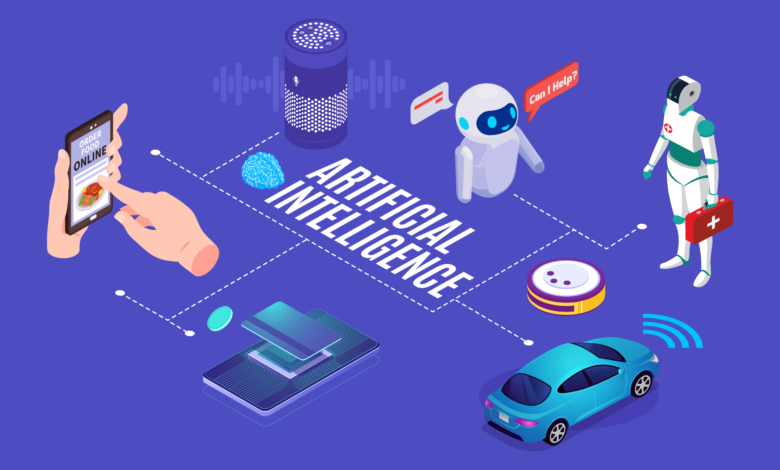AI in Daily Life: Examples of Artificial Intelligence in Everyday Activities

Artificial Intelligence (AI) has become an integral part of our daily lives, often in ways we don’t even realize. From virtual assistants to smart home devices, AI enhances convenience, efficiency, and decision-making in numerous ways. This article explores real-world examples of AI in daily life, demonstrating how it impacts various aspects of our routines.
AI in Smartphones and Virtual Assistants
One of the most common ways AI integrates into daily life is through smartphones. AI-powered virtual assistants like Siri, Google Assistant, and Alexa help users perform tasks effortlessly. Whether setting reminders, answering queries, or controlling smart home devices, these AI assistants rely on natural language processing (NLP) and machine learning to improve their responses over time.
In addition, AI is used in smartphones for facial recognition, enabling secure access without passwords. Camera applications leverage AI for features like portrait mode, scene recognition, and enhanced image processing, providing professional-quality photography at the tap of a button.
AI in Social Media and Entertainment
Social media platforms use AI to personalize user experiences. The recommendation algorithms on Facebook, Instagram, Twitter, and TikTok analyze user preferences and interactions to curate feeds tailored to individual interests. This ensures users see more relevant content, making their social media engagement more enjoyable and engaging.
Similarly, streaming services like Netflix, YouTube, and Spotify use AI-driven recommendation engines to suggest movies, videos, and music based on viewing and listening habits. These intelligent algorithms analyze past behavior to predict preferences and improve content discovery.
AI in E-Commerce and Online Shopping
Online retailers and e-commerce websites rely heavily on AI to enhance user experiences and increase sales. Amazon, eBay, and other e-commerce giants use AI to suggest products based on browsing history, purchase behavior, and customer preferences.
Chatbots powered by AI provide 24/7 customer support, assisting users with inquiries, returns, and recommendations. AI is also used in dynamic pricing, where retailers adjust prices in real time based on demand, competitor pricing, and other factors.
AI in Smart Homes and IoT Devices
AI-driven smart home devices make daily tasks more convenient and efficient. Smart thermostats like Nest and Ecobee learn user preferences and adjust room temperatures accordingly, leading to energy savings and improved comfort.
Similarly, AI-powered security cameras and doorbells, such as Ring and Arlo, use motion detection and facial recognition to enhance home security. Smart speakers and voice-controlled systems, including Amazon Echo and Google Home, allow users to control lighting, appliances, and other connected devices with simple voice commands.
AI in Healthcare and Fitness
AI is revolutionizing the healthcare and fitness industry by providing early disease detection, personalized treatments, and health monitoring. Wearable fitness trackers like Fitbit and Apple Watch utilize AI to analyze physical activity, heart rate, and sleep patterns, offering insights to improve health and well-being.
Medical AI applications assist doctors in diagnosing diseases more accurately, predicting patient outcomes, and automating administrative tasks. AI-powered chatbots help patients schedule appointments, receive health advice, and even detect symptoms based on their inputs.
AI in Finance and Banking
AI is transforming finance and banking by making transactions faster, safer, and more convenient. Banks use AI-powered fraud detection systems to monitor transactions in real time and identify suspicious activities, preventing financial losses.
Chatbots and virtual assistants help customers check account balances, transfer funds, and receive financial advice. Robo-advisors, like Betterment and Wealthfront, provide automated investment strategies, helping users grow their wealth based on AI-driven market analysis.
AI in Transportation and Navigation
AI plays a crucial role in modern transportation, from ride-sharing services like Uber and Lyft to navigation applications like Google Maps and Waze. These platforms use AI to analyze traffic conditions, predict arrival times, and suggest the fastest routes.
Autonomous vehicles, such as those developed by Tesla and Waymo, utilize AI for self-driving capabilities. AI systems process real-time sensor data to navigate roads, detect obstacles, and ensure passenger safety.
AI in Education and Learning
The education sector is increasingly adopting AI to enhance learning experiences. AI-powered personalized learning platforms like Duolingo and Khan Academy adapt lessons to individual student needs, making education more engaging and effective.
Teachers and students benefit from AI-driven tools that automate grading, provide tutoring assistance, and offer real-time feedback. AI also enables remote learning solutions, making education accessible to students worldwide.
Conclusion
AI has seamlessly integrated into various aspects of daily life, making tasks more efficient, personalized, and convenient. From smartphones to healthcare, finance, and transportation, AI continues to shape the way we interact with technology and the world around us.
As AI technology advances, its role in everyday life will expand further, bringing even greater improvements to how we work, communicate, and live. Understanding these real-world applications of AI helps us appreciate its benefits and prepare for future innovations.
Frequently Asked Questions (FAQs)
1. How does AI affect our daily lives?
AI enhances convenience in daily tasks by automating processes, providing personalized recommendations, and improving decision-making across various industries.
2. What are some examples of AI in daily life?
Common examples include virtual assistants, smart home devices, social media algorithms, healthcare applications, and AI-driven finance solutions.
3. How does AI improve productivity?
AI automates repetitive tasks, reduces human errors, and optimizes workflows, allowing people to focus on more meaningful and creative work.
4. Is AI safe to use in daily life?
AI is generally safe when used responsibly. However, ethical concerns like data privacy and algorithmic biases should be addressed to ensure fair and secure applications.



